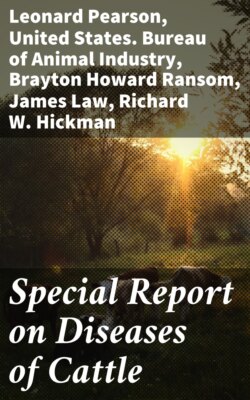Читать книгу Special Report on Diseases of Cattle - Lowe - Страница 51
На сайте Литреса книга снята с продажи.
DROPSY OF THE ABDOMEN (ASCITES).
ОглавлениеIn this disease there is a serous, or watery, effusion in the cavity of the abdomen.
Causes.—When old animals are fed on innutritious feed or when reduced by disease, they become anemic; in other words, their blood becomes impoverished and dropsy may follow. An innutritious and insufficient diet produces the same effect in young animals. It is one of the results of peritonitis, and may also arise from acute or chronic inflammation of the liver, such as is of common occurrence when flukes are present in the liver in large numbers. Heart disease and chronic lung disease may be followed by ascites. It is sometimes, in calves, a symptom of infestation with worms.
Symptoms.—A gradual increase in the size of the abdomen at its lower part, while the flanks becomes hollow; pallor of the mucous membrane of the mouth and eye; weak and sluggish gait; want of appetite, and irregularity in ruminating. On percussion or tapping the surface of the abdomen with the fingers, a dull sound is produced. If the hand and arm are oiled and passed into the rectum as far as possible, on moving the hand from one side to the other the fluctuation caused by the presence of fluid in the abdomen may be felt.
Treatment.—If possible the cause must be discovered and removed. The diet should be nutritious, and in those cases in which we have merely to deal with anemia (the bloodless state) arising from insufficient diet, the use of tonics and diuretics, at the same time keeping the skin warm, may bring about a gradual absorption of the fluid contained in the abdomen. One of the following powders may be mixed with the animal's feed three times a day; or, if there is any uncertainty as to its being taken in that way, it should be mixed with sirup, so as to form a paste, and smeared well back on the animal's tongue with a flat wooden spoon: Carbonate of iron, 3 ounces; powdered gentian, 3 ounces; powdered nitrate of potassium, 3 ounces; mix and divide into 12 powders. The administration of purgatives which promote a watery discharge from the mucous surface of the bowels also tends, by diminishing the serum of the blood, to bring about absorption and a gradual removal of the fluid contained in the abdomen. Large doses should not be given, but moderate ones should be administered morning and night, so as to produce a laxative effect on the bowels for several days. To attain this end the following may be used: Sulphate of soda, 8 ounces; powdered ginger, half an ounce; to be mixed in 2 quarts of tepid water and given at one dose.
